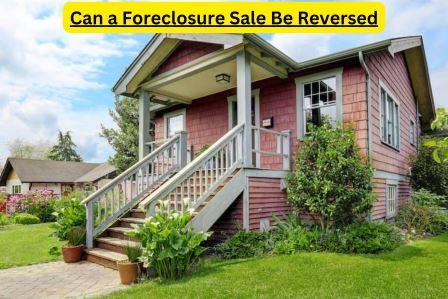Facing foreclosure can be overwhelming, especially for homeowners with reverse mortgages. A critical question that arises in this situation is, can a foreclosure sale be reversed? This article will discuss legal avenues to reverse foreclosure sales, including possible errors during the foreclosure process, legal interventions like bankruptcy, and state-specific redemption periods. We will also explore a real-life case study and answer common questions about foreclosure.
Foreclosure is a process by which a lender can reclaim a property when the borrower defaults on loan payments. In the context of reverse mortgages, although homeowners don’t make monthly payments, they must comply with conditions like paying property taxes and keeping the home in good repair. This blog will explore the circumstances under which a foreclosure sale can be reversed, including procedural errors, loan modification negotiations, and bankruptcy options.
What Is Foreclosure?
Foreclosure occurs when a lender takes ownership of a property after a borrower fails to meet loan terms. In standard mortgages, this happens due to missed monthly payments. However, in reverse mortgages, it can occur if the borrower fails to meet the loan’s other conditions, such as maintaining the property or paying taxes and insurance.
Types of Foreclosure
- Judicial Foreclosure: This involves a lawsuit filed by the lender to foreclose. It typically takes longer but allows homeowners to present defenses in court.
- Non-Judicial Foreclosure: This type skips court proceedings and is faster, relying on a “power of sale” clause in the mortgage agreement. It’s often harder to reverse due to the speed of the process.
Can a Foreclosure Sale Be Reversed?
Yes, a foreclosure sale can be reversed in certain circumstances. This process depends on various factors like legal errors, missed deadlines, or negotiations between the homeowner and the lender.
1. Legal Errors in the Process
If a lender fails to follow state-specific foreclosure procedures, such as providing proper notice or filing the necessary paperwork, a homeowner may have grounds to reverse the foreclosure sale. Common legal errors include:
- Inadequate notice of default or sale
- Incorrect filing of foreclosure documents
- Violations of state or federal foreclosure laws
2. Loan Modifications
Homeowners can negotiate with lenders to alter the loan’s terms, making payments more manageable. Successful loan modifications could result in halting the foreclosure process altogether, or even reversing a completed sale if the modification agreement is reached post-sale.
3. Bankruptcy Filing
Filing for Chapter 13 bankruptcy can delay or even reverse a foreclosure sale. This type of bankruptcy allows homeowners to restructure their debts and create a repayment plan, which may include paying off missed mortgage payments over time.
4. Redemption Periods
Some states allow homeowners to redeem their property after a foreclosure sale by paying off the loan balance within a specific timeframe. The redemption period varies by state, and it’s essential to know your state’s laws.
Case Study: Reversing a Foreclosure Sale
Consider the case of John and Mary, a retired couple with a reverse mortgage who faced foreclosure after falling behind on property taxes. Upon receiving a foreclosure notice, they sought legal help to review their options. Here’s how they reversed the sale:
- Step 1: Legal Review: Their lawyer found procedural errors in how the lender served the foreclosure notice, providing grounds to dispute the sale.
- Step 2: Negotiation: They contacted the lender and negotiated a loan modification that allowed them to repay the past-due property taxes over time.
- Step 3: Bankruptcy Filing: As a final measure, they filed for Chapter 13 bankruptcy, which halted the foreclosure and gave them time to work out a payment plan.
Outcome: John and Mary successfully reversed the foreclosure sale and remained in their home through a combination of legal action and negotiations with the lender.
Steps to Reverse a Foreclosure Sale
If you’re wondering can a foreclosure sale be reversed, here are some steps you can take to explore this option:
- Seek Legal Counsel: A lawyer specializing in foreclosure law can review your case and find any procedural errors or legal grounds to challenge the foreclosure.
- Examine the Foreclosure Process: Check for errors or irregularities in the foreclosure notices and court filings.
- Negotiate with the Lender: A lender may be open to modifying the loan, especially if they believe the borrower can resume payments.
- Consider Filing Bankruptcy: Bankruptcy can halt the foreclosure process and may even help reverse it under certain conditions.
- Research State Laws: Some states have post-sale redemption periods, during which you can pay off the debt to reclaim your home.
Let’s Summarize…
Homeowners in financial distress should explore every option to avoid losing their homes to foreclosure. Understanding whether a foreclosure sale can be reversed hinges on knowing the legal errors that may have occurred, considering loan modifications, and understanding your state’s foreclosure laws. Consulting an experienced foreclosure attorney is crucial in protecting your rights and potentially reversing a sale.
See Also- Can I Sell My House Before Foreclosure
FAQs
What is reverse mortgage foreclosure?
A reverse mortgage foreclosure occurs when the borrower fails to meet specific terms, such as paying property taxes or maintaining the property.
Can you recover from a foreclosure?
Yes, recovery is possible through legal actions, loan modifications, or state-specific redemption periods that allow you to reclaim the property.
How do I dispute a foreclosure?
To dispute a foreclosure, you need to file a lawsuit, usually based on procedural errors, and gather evidence supporting your claim.
How do you escape a foreclosure?
You can escape foreclosure by negotiating with the lender, filing for bankruptcy, or selling the property before the sale takes place.

lqf17i